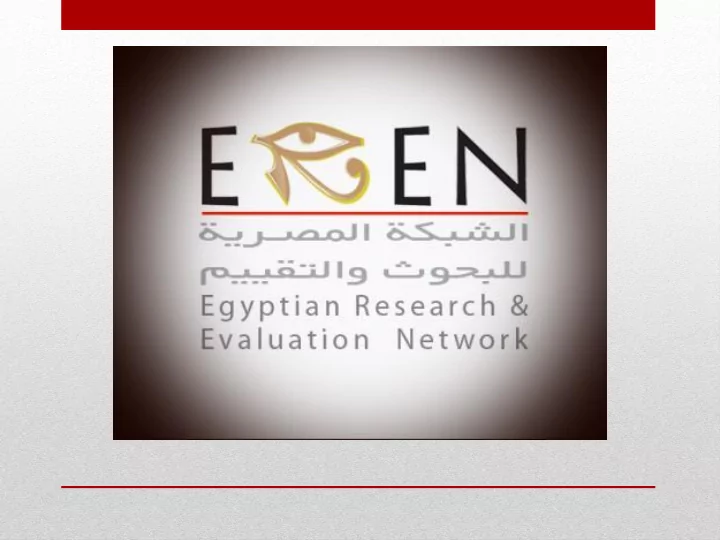

Egyptian Research and Evaluation Network EREN is a distinct and independent platform whose purpose is to enhance the effectiveness, impact and sustainability of development in Egypt by supporting quality evaluation, advancing generation dissemination knowledge , and of conducting dialogue between researchers and policy makers and advocating for evidence based programmes and policies.
ERE EREN M N Mis issio ion • Promote equity based approach in evaluation capacity building to advocate for the rights of the most vulnerable • Ensure advancing good governance practices • Contribute to effective evaluation of different programmes and policies and thus rationalizing the use of resources
Key Strategies of EREN • R&E Capacity Development with special emphasis on development professionals, government officials , media people, researchers, young people and others (TBD). • Knowledge generation and dissemination to enhance culture of evaluation and use its results to improve development effectiveness. • Dialogue stimulation and experience sharing amongst professionals working in, and concerned with boosting development impact. • Advocacy to promote evidence based programs, policies and budgets.
EREN Institutional Capacity • Conferences • Capacity Development • Arabization • Partnerships
Conferences • EREN was initiated through a national conference “ Research & Evaluation in Egypt: Towards Evidence Based Policies" ( 2008 ) • National Conference on “Country - Led M&E to Enhance Transparency and Efficiency ” ( 2013)
EREN EN Ca Capacit acity y Buildi ilding ng 1. Workshops and Seminars: “Designing Evaluation/Research” “Outcome mapping” “Country - Led M&E” "Community- based Monitoring“ “Research methods: Art of Data Collection” “Enhancing the Role of Evaluation in Improving Governance Practices”
Arabization and Publication • Marco Segone Bridging the Gap (2010) • Sarah Earl Most Significant Change (2011) • Marco Segone From Policies to Results (2012) • Several tools, standers and checklists (UNEG, Michel Patton, Stafflebeam, and others) • Ray Rist & Linda Morra Road to Results . (Forthcoming)
Partnerships 1. International: UNICEF , IDRC, UN Women, Dutch National Committee, PLAN International 2. Governmental and National Institutes: • Project Evaluation and Macro Economic Analysis (PEMA) under the Ministry of International Cooperation (MoIC) • National Planning Institute • Egyptian Universities (Assuit, Helwan and Cairo) • National Council for Childhood and Motherhood 3. Civil Society • NGOs • Local and regional VOPEs • Press Syndicate.
Forth Coming • Website for EREN as a knowledge portal on monitoring R&E. (Under Construction) • Mini-IPDET to be conducted with IDRC and regional partners in Egypt January 2013. • Two professional development seminars on "Gender-based Evaluation" and on "Impact Evaluation".
Ch Chall llen enge ges • Political instability and upheavals • Weak culture of generating, utilizing and exchanging information • The need for champions (agents of change) as well as for the political leadership • Lack of resources needed for establishing and/or strengthening M&E systems
Lessons Learn rnt: t: Public • Work on both levels simultaneously: Policy • Adopt the policy/ advocacy strategy as one of the main strategies an evaluation network should be concerned about. • Expand the membership to include different key players and influential members from the beginning • Seek to implement joint programmes and initiatives • Choose the agents of change and make them your façade of promoting the network and defending it whenever needed • Last but not least, work intensively to attract the private sector and the media as both can easily support the whole initiative •
Success Story: 9 curricula that cover the basic level of evaluation and development. Arabization Professional Diploma on Research and Evaluation EREN, UNICEF/ECO and the Dutch National Committee and in collaboration with two Egyptian universities (Assuit and Helwan Universities), Partnership
Main Developmental Lesson • A model that needs to be emulated in other developmental fields and projects • UNICEF’s belief in the significance of the evaluation function and its support to establish and strengthen national evaluation boosted lots of initiatives and constantly provided required technical and financial assistance to make the network happen.
Partnership with UNICEF Main Developmental Lesson EREN EREN UNICEF UNICEF UNICEF EREN
Thank You
Recommend
More recommend